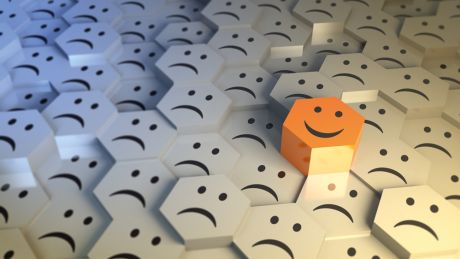How To Be Happier At Work
Use these happiness hacks to make work more fun

A higher level of life satisfaction or a happy disposition will, according to recent research, make you better at your job, more likely to get a promotion, and less likely to quit. One study from the University of Warwick found that happiness led to a 12% jump in productivity and caused a threefold increase in creativity.
Of course, being happy at work is easier said than done. So if you’re one of the majority of people who aren’t exactly tap-dancing to work, here are some ways to boost your levels of on-the-job happiness from Happiness Hacks author Alex Palmer.
It’s not about the money
Whatever meaning you are drawing from your job, one thing is for certain: doing it for money won’t bring you happiness. Studies have found no correlation between higher salaries and higher levels of happiness. A survey of thousands of twins found that income accounted for less than 2% of the difference in their respective levels of well-being. Researchers have found that once a person earns an average of £55,000 per year, they experience a “happiness plateau”. Those making millions may be able to buy nice things, but they don’t enjoy a higher level of happiness commensurate with the higher salary.
Takeaway tip Stop putting so much importance on making more at work. A fatter paycheck is not going to make your smile any wider.
Track your progress
Viewing your activities as part of a long-term goal improves your mood on a chemical level. Participants in a study were asked about personal and family goals, rated their mood, and assessed the relevance of their current activity to these goals during the day, every three hours over a week. At each check-in, subjects also provided saliva samples so their levels of cortisol – known as the “stress hormone” – could be measured. Activities that participants identified as furthering their goals correlated with more positive mood ratings and lower levels of cortisol in their saliva, suggesting that goal-oriented behaviour is important to mood and stress management.
Takeaway tip Make a daily goal chart and track how each step forwards is moving you closer to accomplishing a long-term goal.
See related
- Six Happy Habits To Adopt Today
- Three Mindfulness Exercises To Try On The Way To Work
- How To Avoid Assholes At Work
Take a break
Long live the coffee break. Researchers at the University of Toronto say that frequent breaks improve creativity because our brains have a limited amount of energy, requiring them to be frequently recharged. But just taking a break is not the solution – it’s what you do with it that counts. To recover from work, you need to use your break to do activities that “stop the demands associated with work”. That means engaging in what the researchers defined as “respite activities” – involving either low effort (napping, relaxing or sitting quietly) or a preferred choice (reading a book or spending time with friends).
Get the Coach Newsletter
Sign up for workout ideas, training advice, reviews of the latest gear and more.
Takeaway tip Avoid filling your breaks with more work (even if it’s different from the work you are paid to do). Use your respite to recover fully and get your energy back for when you return to the desk.
Happiness Hacks: 100% Scientific, Curiously Effective (£9.95, The Experiment) by Alex Palmer is released on 1st October.
Pre-order from Amazon | £10.99
Coach is a health and fitness title. This byline is used for posting sponsored content, book extracts and the like. It is also used as a placeholder for articles published a long time ago when the original author is unclear. You can find out more about this publication and find the contact details of the editorial team on the About Us page.

